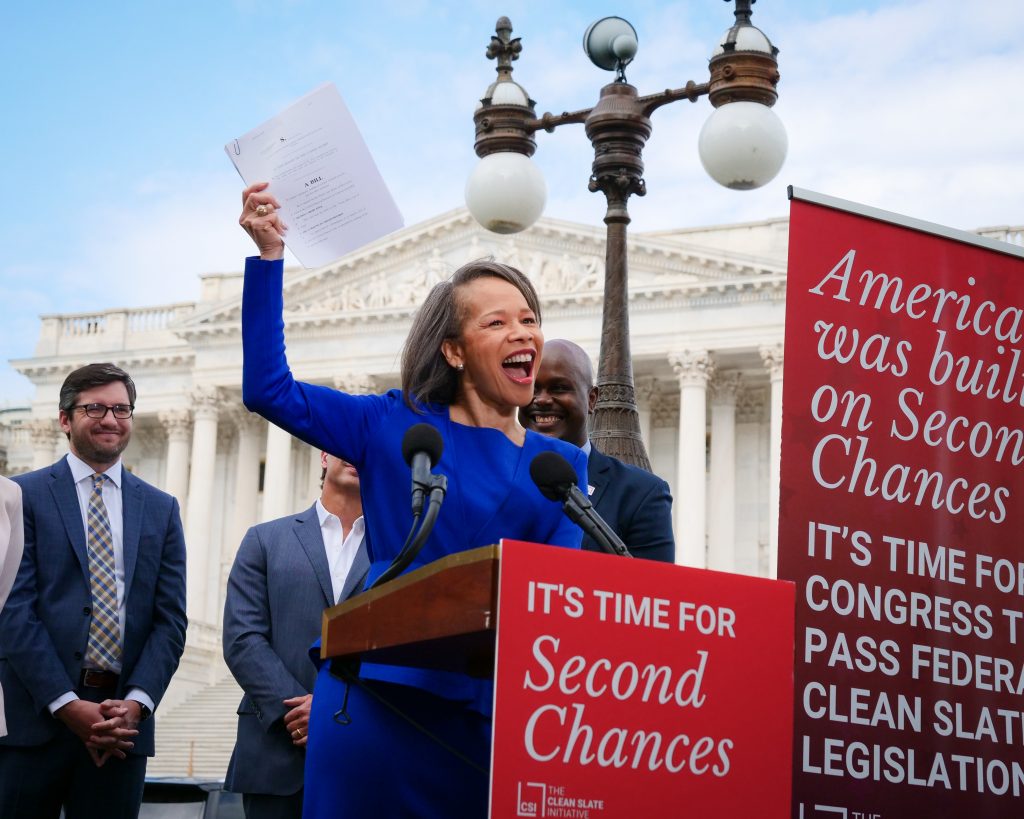April 30, 2025

Senator Blunt Rochester’s full remarks at a press conference this morning can be found here.
Washington, D.C. — During Second Chance Month, Senator Lisa Blunt Rochester (D-Del.) and Senator Rand Paul (R-Ky.) introduced the Clean Slate Act in the United States Senate, legislation to create the first-ever federal process to seal certain low-level federal records, including the automatic sealing of nonviolent federal marijuana offenses. The Clean Slate Act is bipartisan and bicameral, being led in the House of Representatives by Representative Lucy McBath (GA-6) and Nathaniel Moran (TX-1).
The Clean Slate Act has already been enacted in a dozen states across the nation, eliminating barriers for millions of people who were saddled with arrest and conviction records years after completing their sentences and living crime-free.
This legislation will modernize our country’s approach to sealing old arrest and conviction records, ensuring individuals who have been involved with the federal and state legal systems are not perpetually punished for long-ago crimes. Currently, 94 percent of employers, 90 percent of landlords, and 72 percent of colleges and universities use background checks to screen for applicants with records, making it nearly impossible for some to truly move forward with their lives.
Since 2018, 12 states have taken action to address this injustice by passing Clean Slate legislation: California, Colorado, Connecticut, Delaware, Michigan, Minnesota, New Jersey, New York, Oklahoma, Pennsylvania, Utah and Virginia.
“I am so proud to be bringing this bill to the Senate and reintroducing it with Senator Rand Paul,” said Senator Blunt Rochester. “For me, Clean Slate is both a jobs and justice bill. As Delaware’s former Secretary of Labor, I understand how important housing and education can be to securing a good-paying job and improving the quality of life. Between 70 and 100 million people in this country have a record, and through clean slate we can eliminate barriers that prevent millions from finding opportunities during reentry. I want to thank the Clean Slate Initiative for their tireless advocacy on the Clean Slate Act and the Fresh Start Act. We have an opportunity to see these bipartisan bills become law, and I’ll keep working to make sure this happens,” continued Senator Blunt Rochester.
“The Clean Slate Act reflects a simple but powerful truth: people deserve a second chance,” said Representative Lucy McBath. “This bill is about restoring opportunity and providing pathways to sealing records for non-violent offenders who have served their time and remain on a positive path. No one should be limited by a non-violent offense in their past when they have served their time. I thank my colleagues for their work on this important legislation, and I look forward to getting it signed into law.”
“The Clean Slate Act provides individuals with a second chance at life,” said Representative Moran. “Removing barriers for non-violent offenses will ensure these individuals are able to seek employment opportunities and pursue their life calling despite their past.”
“I’ve experienced firsthand how an old record can shut doors long after a sentence ends,” said Dr. Sheena Meade, CEO, The Clean Slate Initiative. “The Clean Slate Act and Fresh Start Act are about redemption, economic opportunity, and human dignity, and ensuring people who have paid for their mistakes have a meaningful chance to rebuild their lives. States have led the way, now it’s time for Congress to pass federal Clean Slate legislation — because justice isn’t served when redemption is denied.”
###
Senator Lisa Blunt Rochester represents Delaware in the United States Senate where she serves on the Committees on Banking, Housing, and Urban Affairs; Commerce, Science, and Transportation; Environment and Public Works; and Health, Education, Labor, and Pensions.